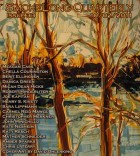The self-consciousness and indecision of the central character suggests a woman who has had a run of bad luck in her personal relationships. Even if very little of her past ended up on the page, did you think a lot about the backstory of this particular character?
Yes, Ravi, I thought a lot about her backstory. When I wrote this piece, I was in the process of writing a collection of microfiction with a central character Diana McPhear. She’s a quirky, adjunct writing prof who spends a lot of time in her head. And I think the voice in “Dinner Parties Where Place Cards Leave No Choice in Seating” echoes Diana’s.
One thing I most admire about the piece is the precision and economy of the prose. I’m curious about your revision process. Does a story like this start as something longer and then get whittled down? Do you go through many drafts?
I think my stories start fairly short, somewhere in the neighborhood of 200-300 words, and often stay there. What interests me is the moment of experience where thought triggers thought, image generates image. The words often rush onto the page, and then I leave them alone. I return to change a word, add an image. Then leave and return again. I may have as many as ten to fifteen drafts. For me revision is almost as exciting as creating because the piece discovers its own language the longer I’m away from it.
I’m fascinated by writers who work in dual mediums. How do you determine whether an idea is better suited to poetry or prose?
That’s a great question, Ravi. If I’m living with a character or in a place, my writing often moves into prose. If I experience a sensation or feeling, my writing moves toward poetry. And then there are times I think the writing’s both like prose and poetry. What interests me is the layering of language, how words radiate into more complicated suggestion and open up new spaces of meaning with repetition, allusion, and compression. I think some of the greatest poets are prose writers. For instance, Toni Morrison, Virginia Woolf, and William Faulkner. You read and re-read a passage, each time gleaning new insight and understanding.
What keeps you inspired during these summer months?
I feel compelled to write but not always inspired. I don’t have a regular time each day that I show up at the computer though I do show up almost every day and trust that the writing will begin. I believe in the power of words, the power of language in all of us. That belief informs not only my personal practice but also my teaching. Whether basic composition, literature or creative writing, I start with ten minutes of freewriting when the constant movement of the hands or fingers allows the unconscious to spill forth.
A chapbook of prose poems was recently released by Burning River Press. Can you talk a little bit more about that?
The title of the chapbook is Girls & Women. Each woman’s voice, from childhood through adulthood, articulates what it means to be identified by the body. Framed by six body poems, the other prose poems are about different girls and women who speak of the shared experience of being female in this country during the last thirty years: girls and mothers, girls and fathers, school, first love, sex, divorce, drugs, and breast cancer. What comes out of this exploration is not a shared wisdom or revelation but acts of endurance and acceptance with the possibility of transcendence. These girls and women will survive.



 The core workshop of SmokeLong Fitness is all in writing, so you can take part from anywhere at anytime. We are excited about creating a supportive, consistent and structured environment for flash writers to work on their craft in a community. We are thrilled and proud to say that our workshop participants have won, placed, or been listed in every major flash competition. Community works.
The core workshop of SmokeLong Fitness is all in writing, so you can take part from anywhere at anytime. We are excited about creating a supportive, consistent and structured environment for flash writers to work on their craft in a community. We are thrilled and proud to say that our workshop participants have won, placed, or been listed in every major flash competition. Community works.